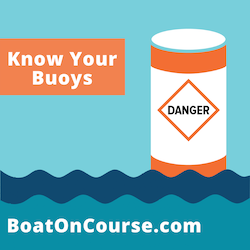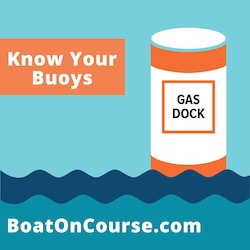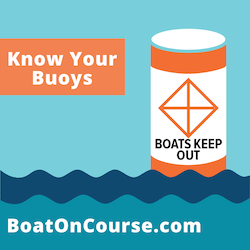Buoy Basics
What you see depends on where you boat—whether inland or offshore. Always review nautical charts for safe navigation. 
-
4,439reported accidents in 2021
-
658reported deaths in 2021
-
75%of deaths occurred on boats where the operator had no boating safety instruction
DO YOU KNOW YOUR BUOYS?
Common Terms
Buoy: Floats on top of the water and moored to the bottom; shape (cylinder or triangular), color, and numbering is important
Beacon: Permanently fixed, such as pole, lighthouse, or another structure, often with reflective tape or light
Channel Marker: A buoy or beacon that marks a channel
Dayboard or daymarker: Informational signs
Color of Buoys
RED AND GREEN
Marks the best channel; like road lanes, stay between these markers and keep to the right. These are samples of red and green buoys:


Remember these navigation tips:
- Red are EVEN-numbered, green are ODD-numbered.
- Number on the buoy will decrease as you head further out in open water, and increase as you head toward shore.
- Remember the phrase, “Red, Right, Returning.” If returning to land, keep the red buoy on your right (starboard). If heading out to open water, keep the green buoy on your right (starboard).
- Markers with both red and green indicate a junction of navigable channels; the top color indicates the direction of the preferred channel.
ORANGE AND WHITE
Alerts boaters to potential dangers and regulations noted by the shape on the buoy. These are samples of orange and white buoys:


- Diamond: Alerts boaters to dangers or hazards.
- Circle: Indicates areas with restricted operation, such as no wake zone or speed limit.
- Diamond with a cross: Designates areas where boats are prohibited, such as a swim area.
- Square: Provides helpful information such as directions, distances, and locations.
BLACK AND WHITE
Marks dangers such as shallow areas or rocks; never pass through a group of these buoys or pass between the buoys and shore.

WHITE AND BLUE
Indicates where mooring or tying up is allowed; check your local waters to see which are public versus private. These may be cylinder or round shape.

Social Media Content
Click on any image to download the high resolution image.
Support for Outreach Events
Request educational boating flyers and outdoor signs.
Test Your Knowledge
Find out how much you know about navigational buoys by putting your knowledge to the test. Watch each of these videos and take the following quiz.
Learn more about the U.S. Coast Guard’s U.S. Aids to Navigation.
Please contact outreach@safeboatingcouncil.org if you need original artwork files to resize for your outreach efforts.



